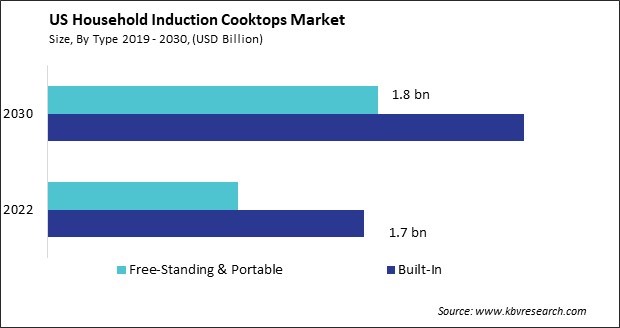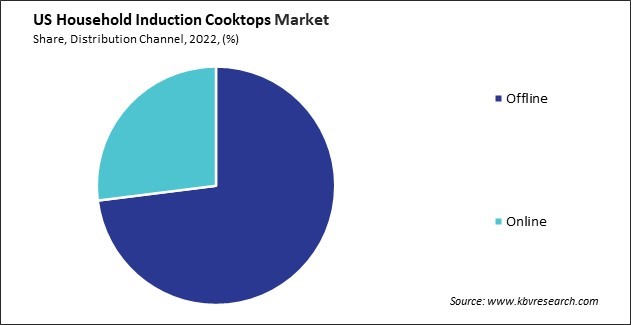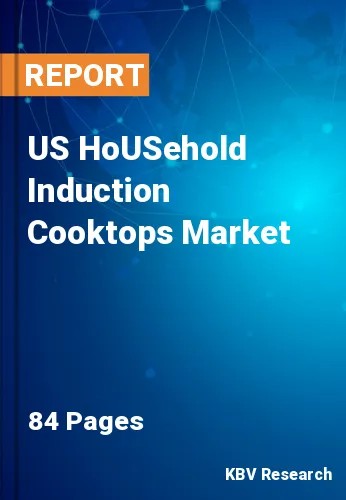The USA Household Induction Cooktops Market size is expected to reach $4.5 billion by 2030, rising at a market growth of 6.1% CAGR during the forecast period. In the year 2022, the market attained a volume of 5,920.8 thousand units, experiencing a growth of 6.5% (2019-2022).
The household induction cooktops market in the United States presents a vibrant and evolving landscape shaped by changing consumer preferences, technological advancements, and a growing emphasis on energy efficiency. As a segment within the broader kitchen appliance industry, the industry is characterized by a mix of established players, innovative newcomers, and evolving product offerings that cater to diverse consumer needs.

Changing consumer preferences are shaping the U.S. household induction cooktops market dynamics. The hustle and bustle of contemporary living have fueled a heightened demand for kitchen appliances that promise speedy and efficient cooking solutions. Induction cooktops, renowned for their quick heating and easy maintenance, align seamlessly with the requirements of busy American households. Moreover, their modern design contributes to their rising popularity among consumers who prioritize functionality and aesthetics in their kitchens.
The retail e-commerce industry has significantly impacted the household induction cooktops market in the United States. As consumer shopping habits evolve, online platforms, including induction cooktops, have become increasingly popular for purchasing household appliances. The e-commerce platform's reach has expanded the industry by connecting U.S. consumers with a variety of sellers and manufacturers, irrespective of geographical constraints. This has led to increased competition among brands, fostering innovation and the introduction of advanced technologies in the household induction cooktops market.
In the third quarter of 2023, retail e-commerce sales in the United States were estimated to be $284.1 billion by the Census Bureau of the Department of Commerce. Compared to the second quarter of 2023, e-commerce sales increased by 2.3 percent (±0.4%). Total retail sales for the third quarter of 2023 were estimated at $1,825.3 billion, an increase of 1.5 percent (±0.2%) from the second quarter of 2023. The third quarter of 2023 e-commerce estimate increased by 7.6 percent (±1.2%) from the third quarter of 2022, while total retail sales increased by 2.3 percent (±0.4%) in the same period. E-commerce sales in the third quarter of 2023 accounted for 15.6 percent.
The rise in energy efficiency and sustainability within the U.S. household induction cooktops market is driven by consumer preferences, environmental consciousness, and technological innovation. American consumers increasingly prioritize eco-friendly practices and energy efficiency in their homes, influencing their choice of kitchen appliances. Induction cooktops have gained prominence due to their inherent energy-efficient design, offering precise and rapid heating to cookware through electromagnetic energy transfer.
Consumers actively seek kitchen solutions that align with their sustainability goals in the U.S., where environmental awareness is rising. Induction cooktops contribute to these objectives by minimizing energy wastage and providing a faster and more efficient cooking process. The direct and instantaneous heat transfer characteristic of induction technology enhances cooking precision and reflects a commitment to reducing overall energy consumption in American households.
Sustainability features embedded in induction cooktops cater specifically to U.S. consumer preferences. The precise temperature control inherent in these appliances aligns with responsible energy use, reducing the risk of overcooking and optimizing energy consumption. Additionally, advanced functionalities like automatic shut-off, timers, and residual heat indicators enhance overall energy efficiency and safety in American kitchens. As a result, household induction cooktops have become synonymous with modern, environmentally conscious kitchen practices, positioning them as a leading choice for U.S. consumers seeking both advanced cooking technology and a reduced environmental footprint in their homes.
The surge in awareness and adoption of household induction cooktops in the U.S. is propelled by a convergence of factors reflecting consumer preferences and societal trends. A key driver is American consumers' heightened focus on sustainability and energy efficiency. With their innovative technology that directly transfers electromagnetic energy for precise heating, induction cooktops align perfectly with the growing demand for environmentally conscious kitchen appliances in the U.S.
Technological advancements embedded in household induction cooktops are crucial in driving adoption in the U.S. market. Features like precise temperature control, which minimizes the risk of overcooking, resonate with American consumers' preference for sophisticated and user-friendly kitchen solutions. The rapid and direct heat transfer of induction technology enhances cooking precision, appealing to those seeking both efficiency and convenience in their culinary endeavors.
Environmental considerations are paramount in shaping consumer choices in the U.S., and household induction cooktops meet these expectations with minimal energy wastage and reduced carbon footprint. The U.S. government's initiatives, such as Energy Star certifications and rebates, further incentivize the adoption of energy-efficient appliances, fostering a favorable environment for the widespread acceptance of induction cooktops across American households. Thus, the growing awareness and adoption of household induction cooktops in the U.S. reflect a harmonious blend of energy efficiency, technological innovation, and a cultural shift toward sustainability.

The household induction cooktops market in the United States is a competitive landscape shaped by a dynamic interplay of established players, technological innovators, and evolving consumer preferences. Major appliance manufacturers such as Whirlpool, General Electric (GE), and Frigidaire dominate the industry, leveraging their brand recognition and extensive distribution networks. These industry giants offer a range of induction cooktop models, often integrated into broader kitchen appliance suites, providing consumers with comprehensive solutions.
However, the industry is not solely the domain of traditional appliance manufacturers. Niche players and specialized brands like Breville and True Induction have gained traction by focusing on innovation and catering to specific consumer needs. Breville, known for its high-quality kitchen appliances, offers induction cooktops with advanced features, targeting U.S. consumers seeking premium performance and design aesthetics. True Induction, on the other hand, positions itself as a specialist in induction technology, offering portable and built-in cooktops with a focus on efficiency and functionality.
The emergence of smart home integration within induction cooktops further intensifies the competitive dynamics. Brands like Samsung and Bosch are incorporating smart technologies, allowing users to control and monitor their cooktops remotely through smartphone apps. This technological integration enhances user convenience and positions these brands as frontrunners in the race to meet the evolving expectations of tech-savvy consumers.
The retail landscape also plays a crucial role in shaping competition, with appliance retail giants like Best Buy, Home Depot, and Lowe's influencing consumer choices through extensive product displays and promotional strategies. These retailers often showcase a variety of induction cooktop models, allowing consumers to compare features, prices, and brands before making informed purchase decisions.
In recent years, new entrants and startups have injected innovation into the household induction cooktops market in the U.S. Brands like Hestan and Fulgor Milano are disrupting the industry by introducing cutting-edge design concepts and advanced functionalities. Hestan, known for its premium kitchen appliances, offers induction cooktops that combine high-performance features with a sleek aesthetic, targeting the discerning consumer seeking style and functionality. With its European-inspired designs, Fulgor Milano caters to consumers who prioritize sophisticated aesthetics without compromising cooking capabilities.
Consumer preferences for sustainable and eco-friendly options influence competition in the household induction cooktops market. Brands like Viking and Thermador emphasize energy efficiency in their induction cooktop offerings, aligning with the increasing environmental consciousness among consumers. These brands provide high-performance cooktops and environmentally responsible choices contributing to energy conservation.
By Type
By Distribution Channel
Our team of dedicated experts can provide you with attractive expansion opportunities for your business.

